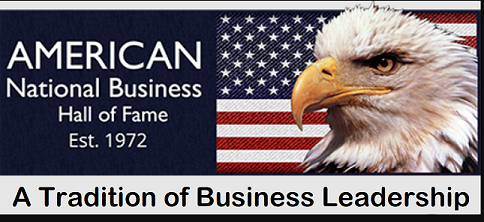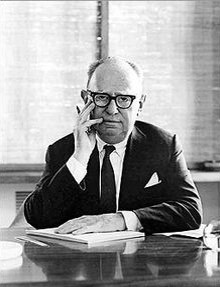Leo Burnett Company, Inc
Click for PDF version of Leo Burnett -- Leo Burnett Company, Inc
-- Biography
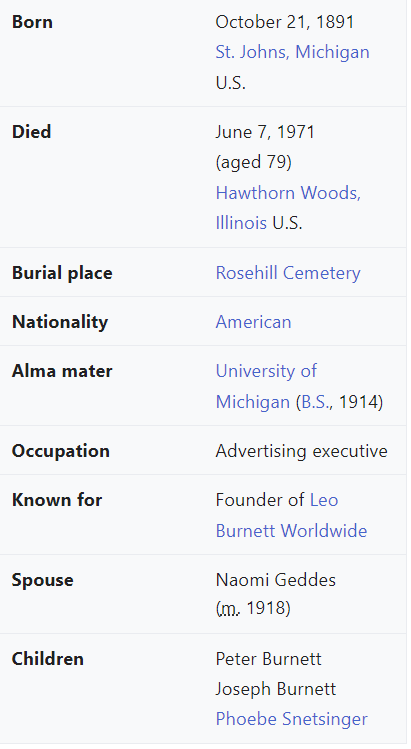 Picture of Leo Burnett life stats -- Leo Burnett Company, Inc.
Picture of Leo Burnett life stats -- Leo Burnett Company, Inc.
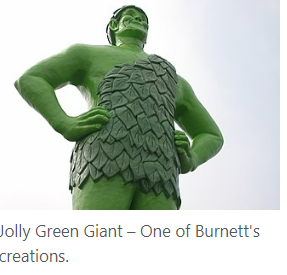 Picture of Jolly Green Giant – One of Burnett's creations
Picture of Jolly Green Giant – One of Burnett's creations
Click for Leo Burnett -- Leo Burnett Company, Inc. - Wikipedia page
Introduction
Leo Burnett
Born in St. Johns, Michigan, Leo Burnett studied journalism at the University of Michigan, where he was editor of the school newspaper. He worked as a police reporter for the Peoria Journal and later worked in advertising with the Cadillac Motor Company, where he became advertising manager in 1919. He next moved to Lafayette Motors, then to the Homer McKee Agency in Indianapolis and finally to Erwin, Wasey and Company.
In 1935 Leo Burnett borrowed $50,000. and established the Leo Burnett Company, Inc. in Chicago. A friend, Jack O'Kieffe joined Leo Burnett in the establishment of the new company. Originally they had three accounts -- Green Giant, Hoover, and Realsilk Hosiery, totaling $900,000 in revenue for the new company. Little did they know that the company would become the fifth largest advertising agency in 1973.
The first year was a real struggle. O'Kieffe and Burnett wanted to build a significant little agency on just a few high grade accounts. Burnett believed in striving for excellence. They pursued Hershey Chocolate Company, whose product was excellent but was not advertised. Burnett and O'Kieffe were confident they could persuade Hershey with a quality advertising campaign. Burnett proceeded to Hershey, Pennsylvania to attempt to sell Hershey Chocolate on his advertising package. Disappointed, he returned with no sale. O'Kieffe and Burnett modified the campaign and pursued Wrigley Gum. Again, no sale. As a result, within the first year O'Kieffe and Burnett failed to add a dollars worth of new business to the new company.
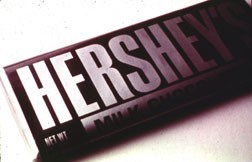 Picture of Hershey candy bar
Picture of Hershey candy bar
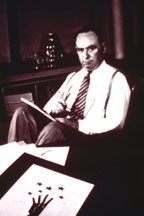 Picture of Leo Burnett
Picture of Leo Burnett
Dick Heath joined the Leo Burnett Company, Inc. and brought in some small businesses. After a disagreement with Burnett, Heath left the company. Another year passed and the Leo Burnett Company failed to add any new business clients. Finally, O'Kieffe talked Leo Burnett and Dick Heath into making up and the company began to prosper.
In 1940 Leo Burnett landed the American Meat Institute account. He launched a memorable campaign in 1945, in which red meat was placed on a red background and the copy urged the reader to eat more meat. This "red on red" campaign became a classic example of Burnett's technique of "stressing the inherent drama in the product".
A. New York Takes Notice
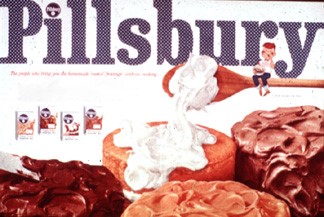 Picture of Pillsbury Advertisement
Picture of Pillsbury Advertisement
After ten years of moderate growth a break occurred that would dramatically accelerate the company's success in 1949. Burnett was awarded the Pillsbury Family Flour account. Shortly there after, the Burnett agency introduced the Pillsbury Bake Off, which became a dramatic attention-getting campaign. Following the success of the Pillsbury campaign, Burnett acquired the Kellogg's's Cereal advertising account. These two accounts gave Burnett Company the national recognition for advertising campaigns that were not at all like the competitions' ads.
Burnett earned the account of the New York based Tea Council. This account signaled to the New York based advertising giants that a new advertising agency in Chicago was emerging. In 1950, Proctor and Gamble contracted with the Burnett Company Inc. for an institutional campaign, sealing the Burnett Company's level of importance in the advertising industry.
Leo Burnett initiated one of the classic campaigns of advertising history. Philip Morris had hired the Burnett agency in 1955 to develop and advertising campaign for the Marlboro cigarette. Advertising Age describes the campaign as follows. Burnett " took a minor cigarette brand with a predominantly feminine image and turned it into big seller by using closeup photos of ruggedly masculine men".
In subsequent years, Burnett continued to acquire other major accounts. Some of the most memorable accounts and advertising campaigns included - Schlitz Beer for it's " Real Gusto in a great light beer" and "When you're out of Schlitz, you're out of beer" campaigns, Allstate, Maytag, and United Airlines for the "Fly the friendly skies of United" campaign.
 Picture of Marlboro Advertisement
Picture of Marlboro Advertisement
B. The Chicago School of Advertising
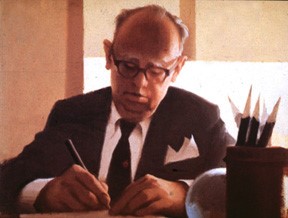 Picture of Leo Burnett
Picture of Leo Burnett
Leo Burnett had the rare distinction of leaving behind a new approach to the creative side of the advertising business. Burnett had developed a creative approach that many termed 'the Chicago School of Advertising" It stressed finding the inherent drama in the product and writing the ad out of the drama, rather than using mere cleverness.
Burnett felt that Chicago was the Midwest - the heart and soul of the nation. In addition, he felt that the down to earth, wide-eyed perspective of Midwesterners facilitated their ability to create ads that appealed to the majority of Americans. Thus using his rare ability to see and use the dramatic in products and the acceptable perspective of Midwesterners, Burnett's philosophy and style spread throughout the advertising industry.
C. Management Style
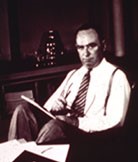 Picture of Leo Burnett
Picture of Leo Burnett
Leo Burnett's management style was as distinctive as his approach to creative advertising. He was hardworking and wanted his associates to be equally devoted. Burnett's consuming urge for excellence was contagious If competition brings out the worst in some men, it brings our the best in others. It brought out the best in Leo Burnett and the best in the people who worked for him.
Hard work alone can not explain Burnetts' success. There are other managerial traits. Perhaps the most significant was his total dedication to the creative side of the business as the source of agency growth. As Leo Burnett noted " There's nothing with quite the marketing leverage of the brilliant copy idea. It has the power to conquer what seem as insurmountable sales problems." This concept guided Burnett to be a leader in the search for the "Brilliant Copy Idea".
Burnett admitted he "rarely attempted to write ads or commercials" instead he provides the direction and vision for many young writers. "My greatest contributions,... have been in uncovering a basic concept now and then, stimulating the fine talent...to do better than they ever thought they could, and or a hell of a lot of editing." (Leo Burnett)
DeWitt (Jack) O'Kieffe, a close associate and co-founder of the agency, identified six techniques that Burnett used to stimulate the creative people around him. These include the Creative Bower, Creative Huddle or Group Think, Dragnet, Thought Piece, Outside Expert, and the Creative Review Committee.
 Picture of Leo Burnett & Co. Logo
Picture of Leo Burnett & Co. Logo
D. Social Responsibility
Leo Burnett's agency was a model of the socially responsible big business. There were two dimensions to this professional performance:
1. Participation in Civic Affairs
The Burnett agency became the volunteer agency for the United States Savings Bond Campaign as well as the annual Easter Seals Fund appeal. Both of these were done as part of the Advertising Council. Burnett served as a leader in the Advertising Council and even president for a short time. Burnett and many of his associates were also actively involved in the Boy Scouts, the Girl Scouts, and the Hadley School for the Blind.
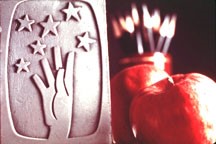 Picture of Leo Burnett & Co.
Picture of Leo Burnett & Co.
2. Approach to Work
Burnett's social responsibility was the way he went about his work. Fairfax Cone, a competitor of Burnett, describes Burnett as a person who remained free of the "seamy side" of advertising. Burnett knew how to apply the loftiest ideals to every day business dealings without sacrificing either.
Conclusion
 Picture of Leo Burnett
Picture of Leo Burnett
Leo Burnett had a creative gift in his ability to stress the inherent drama in the product in his unique advertising campaigns. His use of the products drama instead of mere cleverness has become to be known as the "Chicago School of Advertising". Burnett had a consuming drive for excellence that engulfed his associates in his quest of the best product. Displaying a hard work ethic and a commitment to being a socially responsible company in the advertising industry, Leo Burnett demonstrates why he is a significant part of the Advertising Industry.
Copyright 2001 American National Business Hall of Fame. All Rights Reserved.
American National Business Hall of Fame - Contact
c/o Western Illinois University Libraries WIU Libraries
Macomb, IL 61455
(309)298-2705











